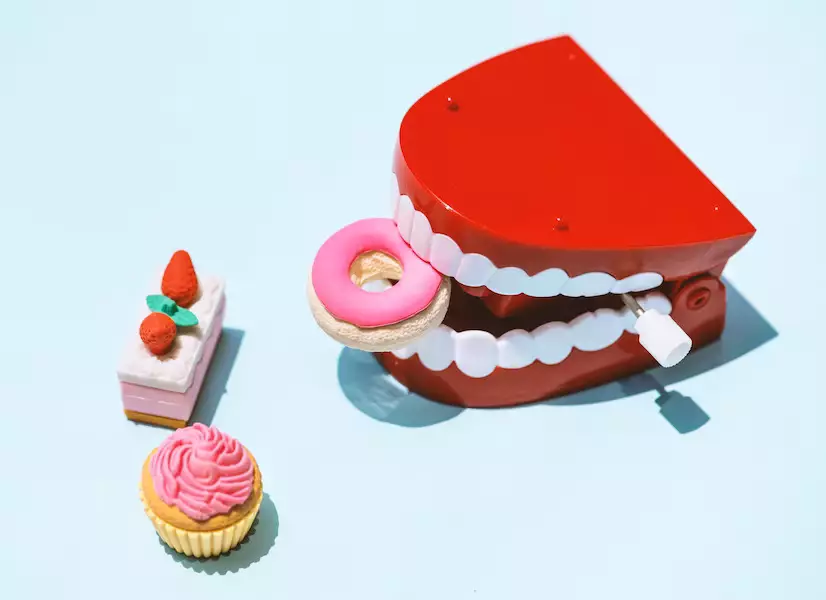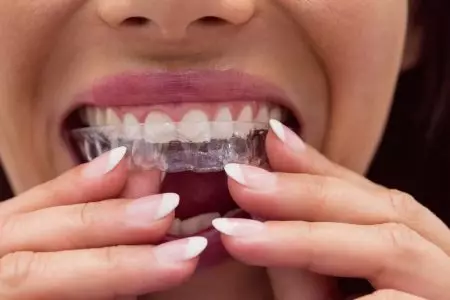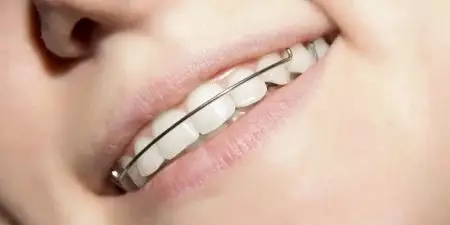Dental health is essential to overall well-being and quality of life. However, many of us are faced with the fact that our teeth are deteriorating. Tooth decay, or tooth decay, is one of the most common oral diseases that can lead to pain, tooth loss, and serious health problems in general. Let’s take a look at the main causes of tooth decay, as well as recommendations for prevention and oral care.
Why and from what teeth quickly deteriorate in adults: causes
Adult tooth decay can be caused by a variety of factors. Let’s look at some of the most common causes of adult tooth decay.
Chronic diseases
Chronic diseases can have a negative impact on dental health. These ailments include:
- diabetes;
- hypertension;
- osteoporosis;
- arthritis;
- gastritis;
- metabolic disorder.
Dental health is also negatively affected by immune-compromising diseases, such as viral hepatitis or HIV.
Improper nutrition
One of the main causes of tooth deterioration is improper diet. The development of tooth decay and other dental problems can occur due to these eating habits:
- Consumption of sugary foods. Frequent consumption of sugar causes the enamel to break down. Bacteria in the mouth feed on sugar and produce acid that damages teeth.
- Frequent eating or constant snacking. Such habits do not allow enough time for the acid in the mouth to be neutralised. This can lead to a constant attack on the enamel of the teeth.
- Highly acidic foods. Acidic foods – citrus fruits, fizzy drinks, sour candies and juices can erode tooth enamel because of their low pH.
It is also not recommended to eat very hot or very cold food. For healthy teeth, include meat, fish, dairy products, fresh vegetables and nuts in your diet. Avoid frequent consumption of sweets, carbonated drinks, tinned fruit and chocolate.
Improper hygiene procedures

Damage to your teeth can be caused by habits such as:
- Improper brushing technique. Many people underestimate the importance of proper brushing technique. Common mistakes include not positioning the toothbrush correctly, not brushing long enough, and applying too much pressure to the teeth. Poor technique can lead to incomplete plaque removal and bacterial build-up.
- Not brushing your teeth regularly enough. Not enough time spent brushing or too long between brushing allows bacteria to multiply and form plaque, which eventually leads to cavities and other problems.
- Ignoring additional hygiene products. In addition to brushing, you should use additional hygiene tools such as floss, interdental brushes, or interdental strips. These tools help remove plaque and bacteria from hard-to-reach areas.
- Choosing the wrong toothpaste and mouthwash. Some toothpastes and mouthwashes contain active ingredients, such as fluoride, that help fight tooth decay and strengthen enamel. Choosing the wrong products or not using them can increase your risk of developing dental problems.
It’s important to change your toothbrushes every three months and don’t forget to clean your cheeks and tongue.
Genetic predisposition
Genetic predisposition is another factor that can affect tooth decay. Some people may inherit weak enamel, tooth sensitivity or a tendency to develop tooth decay from their parents. A tendency to periodontal disease or other inflammatory processes may also be passed on genetically.
Lifestyle and micronutrient deficiencies
Deficiencies of certain micronutrients such as calcium, fluoride, vitamin D and others can negatively affect dental health. Calcium is the main building material of tooth enamel, while fluoride helps to strengthen it and prevent tooth decay. Lifestyle cannot be underestimated either. Constant stress, anxiety and psychological factors can have a negative impact on dental health. Stress can lead to poor oral hygiene, tooth grinding (bruxism) and snacking, which increases the risk of tooth decay and problems with the maxillofacial region.
Improper bite
An improper bite is an important factor that often causes tooth deterioration. It causes problems such as:
-
- Increased stress on certain teeth. An improper bite can create an imbalance in the distribution of force when chewing and speaking. This puts increased stress on certain teeth and surfaces, which can lead to wear, weakness, and deterioration over time.
-
- Cleaning and hygiene problems. An improper bite makes effective brushing and oral care difficult. Teeth that touch improperly or too tightly become difficult to brush or floss, leading to plaque buildup, tooth decay, and gum problems.
- Increased risk of injury. An improper bite can increase the risk of injury to the teeth and oral tissues. Teeth are more vulnerable when they are bumped, dropped, or bitten on hard objects. This can lead to damaged enamel, cracked teeth, and other serious problems.
- Increased risk of developing other dental problems. An improper bite leads to misalignment of teeth, jaw misalignment, or temporomandibular joint dysfunction. This causes pain, discomfort, chewing problems and other oral health problems.

It is important to see a dentist to diagnose and treat a malocclusion. The doctor will be able to determine the causes and consequences of a malocclusion and suggest suitable orthodontic treatments.
Harmful habits
Harmful habits have a negative impact not only on a person’s overall health, but also on their teeth. Here are some of the main bad habits that cause your teeth to deteriorate:
- Tobacco smoking. This is a major one of the causes of developing dental problems. Tobacco contains toxic substances that can cause gum disease, stomatitis, and even oral cancer. Smoking can also impair the blood supply to the gums and slow down the healing process after surgery.
- Alcohol consumption. Excessive consumption of harmful beverages has a negative impact on dental health. Alcohol can cause dry mouth, which promotes the growth of bacteria and tooth decay. Alcohol can also increase the risk of gum disease and damage tooth enamel.
- Opening hard objects with your teeth. This habit can wear down and damage your teeth. If you bite your nails or use your teeth to open packages, hold objects, or nibble on pencils, cracked, chipped, and deformed teeth can occur.
- Tooth grinding (bruxism). This is the involuntary clenching and rubbing of the teeth, most often during sleep. This habit can wear down enamel, damage teeth and even cause pain in the jaw and facial muscles.
- Poor chewing of food or ignoring solid foods. Don’t be lazy, but don’t go to extremes either.
- Constant chewing of hard candy, ice or other hard objects. This habit will cause damage to your teeth, especially if they are already chipped or cracked. This can lead to the destruction of enamel and even broken teeth.
Give up bad habits to keep your teeth healthy.
Wiping off the enamel layer
One of the main causes of tooth deterioration is the wearing away of the enamel layer. Enamel is the hard, protective shell that covers the teeth. It serves as a barrier against damage, acid exposure, and helps prevent cavities. However, various factors can cause enamel to wear away and deteriorate, such as heavy chewing and chipping. Enamel abrasion also occurs with bruxism or malocclusion. It is important to realise that enamel wear is a gradual process and its rate depends on various factors. Remember that it is not possible to restore the enamel layer, so it is necessary to monitor its condition.
Thinning of the mucous membrane
Thinning of the oral mucosa can cause tooth deterioration and lead to various dental problems. It mainly occurs due to two reasons:
- Mechanical trauma. Damage to the mucosa can occur due to mechanical trauma, such as improper use of a toothbrush, stiff floss, or sharp objects. Permanent trauma can cause thinning and irritation of the mucosa, which contributes to ulcers, canker sores, and other problems.
- Viral or fungal infections. Some viruses, such as herpes and fungi, can infect the oral mucosa. This can lead to thinning, ulcers and other symptoms.
Also thinning of the mucosa occurs with age.
Reduction in salivary gland activity
Reduced salivary gland activity can be one of the causes of tooth decay and damage to tooth enamel. Saliva plays an important role in protecting teeth, removing food debris, regulating the pH of the mouth and preventing bacterial growth. However, the activity of the glands can decrease. This happens due to reasons such as:
- Xerostomia. This is a condition in which there is an insufficient amount of saliva in the mouth. Reduced salivary gland activity can lead to dry mouth, which increases the risk of tooth decay, gum disease and tooth decay.
- Side effects of medications. Some antidepressants, antihistamines, antihypertensives and diuretics can affect saliva production and cause xerostomia.
- Medical procedures and treatments. For example, radiation therapy or chemotherapy for cancer treatment can damage the salivary glands and reduce saliva production.
- Aging. With age, there can be a decrease in salivary gland activity.
Oral dryness caused by reduced salivary gland activity can increase the risk of tooth decay, plaque buildup, mucosal irritation, and other dental health problems.
What to do to maintain your oral health

To maintain your oral health, it’s important to follow a number of guidelines and take regular care of your teeth and gums. Here are some basic recommendations:
- Proper oral hygiene. Regular brushing twice a day for two minutes helps remove plaque and prevents tartar formation. Use the right toothbrush and fluoride toothpaste. Also, don’t forget to brush your tongue to remove bacteria that can cause bad breath. Flossing or using interdental brushes regularly can help clean the space between your teeth.
- Good nutrition. A balanced diet rich in fruits, vegetables, whole grain products and low sugar is important for oral health. Limit your intake of sweet and acidic foods, which can increase the risk of tooth decay. Drink adequate amounts of water to keep your mouth moisturised.
- Dental visits. Regular visits to the dentist can help detect and prevent dental problems. It is recommended that you visit the dentist at least twice a year for a professional dental cleaning, oral examination and early detection of any problems.
- Avoid smoking and drinking alcohol. Smoking tobacco and drinking alcohol have serious negative effects on your oral health. Try to get rid of these bad habits to reduce your risk of developing gum disease, oral cancer, and other problems.
- Use protection when playing sports. Wear helmets and bibs when engaging in contact sports activities. This will help prevent damage to teeth and gums.
- Avoid stress. Bad emotions have a negative impact on oral health. Practising relaxation techniques such as yoga, meditation or deep breathing can help reduce stress and maintain oral health.
Remember that maintaining your oral health requires regular and consistent care.
To summarise
Dental health depends on many factors. Therefore, you need to pay proper attention to dental care, proper diet and healthy lifestyle. Also, visit your dentist regularly to detect dental problems at an early stage and start treatment in time.
 Damage to your teeth can be caused by habits such as:
Damage to your teeth can be caused by habits such as:
 It is important to see a dentist to diagnose and treat a malocclusion. The doctor will be able to determine the causes and consequences of a malocclusion and suggest suitable orthodontic treatments.
It is important to see a dentist to diagnose and treat a malocclusion. The doctor will be able to determine the causes and consequences of a malocclusion and suggest suitable orthodontic treatments.
 To maintain your oral health, it’s important to follow a number of guidelines and take regular care of your teeth and gums. Here are some basic recommendations:
To maintain your oral health, it’s important to follow a number of guidelines and take regular care of your teeth and gums. Here are some basic recommendations:






